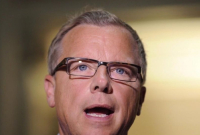Support strong Canadian climate journalism for 2025
Carbon taxes have become such a fetish that sensible people can’t evaluate climate policy anymore.
British Columbia’s new climate plan is the most recent case in point. On a Friday afternoon in August, Christy Clark’s government took out the trash. The premier announced a climate “leadership” plan that doesn’t reduce carbon pollution.
Which is most of what you really need to know. Does a plan reduce global warming emissions, and how much?
There are other, wonkier, points of interest. Does a climate plan create jobs building clean energy? Does it mandate a certain percentage of electric vehicles? What species of emissions pricing (cap-and-trade or carbon tax) does it use? Are there strong regulations on boilers, space heating, etc.?
But normal human beings just need to know if the plan is likely to work and how much it will reduce greenhouse gas emissions.
Instead, all anticipation centered on whether B.C. would kick its carbon tax back into gear. The post-mortems have either bemoaned the decision to leave it frozen at 2012 levels, or condoned the freeze. Almost no one seems to have thought to ask how much this climate plan does for the climate.
Carbon pricing is important. But it is a means to an end, and it may not be the most important. That’s one of the debates getting obscured.
Carbon tax fetishism is insidious. The fetish causes otherwise intelligent people to ignore the real yardstick of success as well as ignoring other important policies. It sucks politicians, analysts, and journalists into groupthink, and the entire national climate conversation is losing the plot.
One prominent apologist for the B.C. freeze actually put the fetish in public view:
“Plenty of new measures are up for debate in this package, but the main issue is [Premier Clark’s] decision to halt further increases in the provincial carbon tax.
Uh … no. The main issue is that B.C.’s emissions are on the rise and the government decided against cutting them back.
Although if we’re getting real here, the main issue really should be how quickly a wealthy country plans to eliminate its carbon emissions altogether, and how close a plan comes to that goal.
Quebec and Ontario plan to reduce carbon emissions 20-25 per cent by 2030 while British Columbia’s will have gone up, probably by quite a lot.
The B.C. climate plan is a useful dress rehearsal. The Trudeau government will start rolling out a climate plan for the whole country this fall. Promises have been made, balloons have been floated. Almost all of them about carbon pricing. And so little about other policies that it’s worth worrying that the feds believe pricing is the litmus test.
Or, more disturbingly, perhaps the feds would prefer we ask if they’d been successful at establishing carbon pricing rather than successful at reducing emissions and fighting global warming.







Comments